Yamaha YVC-1000 User Manual
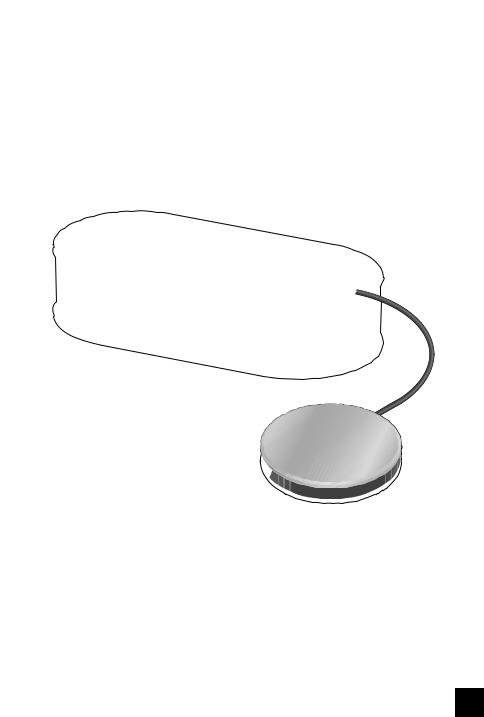
Unified Communications Microphone & Speaker System
YVC-1000
User’s Manual
Update the firmware and use the latest features.
You can download the latest firmware and user's manual from the following website:
http://www.yamaha.com/products/en/communication/download/
EN

YVC-1000 User's Manual
Contents
Introduction |
|
Introduction ......................................................... |
3 |
Available functions ............................................ |
3 |
About this manual ............................................. |
4 |
Controls and functions ........................................ |
5 |
Control Unit (YVC-CTU1000) ......................... |
5 |
Microphone (YVC-MIC1000) .......................... |
9 |
How to use YVC-1000 |
|
Setting up for use ............................................... |
10 |
Installation ....................................................... |
10 |
Connecting the microphone and power |
|
cables ............................................................... |
11 |
Adding microphones and speakers .................. |
11 |
Setup ................................................................ |
12 |
Connecting to communication equipment ...... |
13 |
Connecting to a PC using the USB cable ........ |
13 |
Connecting to a Mac using the USB cable ...... |
17 |
Connecting to a smartphone or |
|
tablet via Bluetooth ......................................... |
20 |
Connecting to a video conference system |
|
using audio cables ........................................... |
23 |
Convenient functions |
|
Using Convenient Functions ............................. |
25 |
Using the optional microphone |
|
(YVC-MIC1000EX) ........................................ |
25 |
Using external microphones ............................ |
26 |
Using external speakers ................................... |
27 |
Using the automatic audio tuning function ..... |
28 |
Changing voice guidance settings ................... |
30 |
Selecting a speaker .......................................... |
31 |
Adjusting the speaker volume ......................... |
32 |
Muting the microphone ................................... |
32 |
Muting the speaker .......................................... |
32 |
Enabling or disabling the Bluetooth function .. |
33 |
Returning to the factory settings ..................... |
34 |
How to use the application |
|
Using the YVC-1000 Configurator ................. |
35 |
Downloading ................................................... |
35 |
Basic usage ..................................................... |
36 |
Changing the setting of |
|
the audio input terminals ................................ |
37 |
Changing the setting of |
|
the audio output terminals .............................. |
39 |
Changing the setting of the USB port ............. |
39 |
Others |
|
Troubleshooting ................................................ |
41 |
Before inquiry ................................................. |
41 |
Q1 A button or indicator is turned off or |
|
flashing ........................................................... |
41 |
Q2 There is a problem with |
|
the audio quality ............................................. |
41 |
Q3 Others ........................................................ |
43 |
Warning guidance list ...................................... |
44 |
Using open source software ............................. |
45 |
2
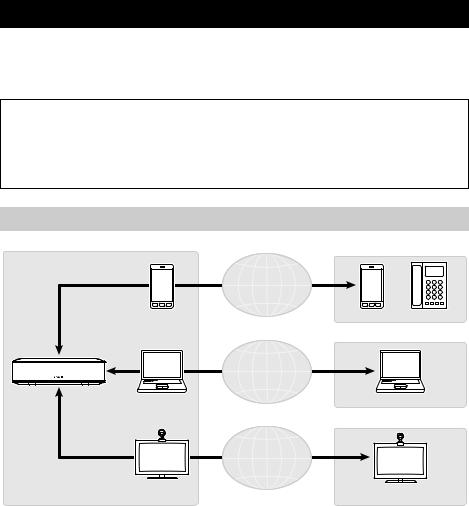
YVC-1000 User's Manual
Introduction
Thank you for purchasing a Yamaha YVC-1000. This product is a unified communications microphone and speaker system that serves as an audio terminal when connected to communication equipment, such as a PC or a Mac, a smartphone or tablet, and a video conference system.
Please thoroughly read this manual before installing and connecting the product.
•No part of this manual may be copied or used in any form without permission of Yamaha.
•The contents of this manual apply to the latest specifications as of the publishing date. To obtain the latest manual, access the following website then download the manual file. http://www.yamaha.com/products/en/communication/download/
•Yamaha is not liable for any loss or damage to data resulting from use of the product. Please note that the warranty covers repair of the product only.
Available functions
|
Audio conference, etc. |
|
Bluetooth® connection |
Mobile telephone |
|
network, Internet, |
||
|
||
|
corporate LAN, etc. |
|
Smartphone |
Smartphone Fixed-line phone |
|
|
Web conference, etc. |
|
USB connection |
Internet, |
|
|
||
|
corporate LAN, etc. |
|
YVC-1000 |
PC/Mac |
|
PC/Mac |
||
|
Video conference |
|
AUDIO connection |
Internet, |
|
|
corporate LAN, etc. |
|
Video conference |
Video conference |
|
system |
||
system |
||
|
■Connection with various communication devices
The product is equipped with three connection interfaces: "USB" to enable a connection with a PC or a Mac, "Bluetooth®" to enable a connection with a smartphone or tablet, and "Analog (AUDIO)" to enable a connection with a video conference system. If necessary, you can simultaneously use these three features: USB, Bluetooth®, and Analog (AUDIO) (audio mixer function).
■"Easy-to-talk" and "easy-to-hear" voice communications
This product employs arrayed microphones with high voice capturing capability and speakers with high voice reproduction capability. The product also provides high-performance audio signal processing functions such as an adaptive echo canceller and noise reduction, realizing "easy-to-talk" and "easy-to-hear" voice communications without skipping or noises.
3

YVC-1000 User's Manual
■Extension of microphone and speaker
The product allows you to connect an optional microphone (YVC-MIC1000EX) or external speakers to extend the sound pickup range or playback range. This feature offers great flexibility for a layout or a multi-participant conference that cannot be covered by only the product.
■Connection with external microphones
The product allows you to amplify the sound from connected external microphones, such as handheld microphones, in your location while having a conversation with the remote location.
■Automatically tuning acoustic settings (Automatic audio tuning function)
The product provides the function that automatically measures acoustic features of the location the product is installed in as well as the positions to place the microphone and speaker, and tunes acoustic settings to the optimal level. Users are not required to make any complicated settings.
■Notifying operation results or problems using the voice guidance (Voice guidance function)
The product provides the function that notifies results of operations such as a Bluetooth connection, problems in acoustic conditions, or the automatic audio tuning procedure in an easy-to-understand way using the voice guidance.
About this manual
■About abbreviations
In this manual, the product names are described as follows.
•Yamaha YVC-1000: the product
•Microsoft® Windows®: Windows
•macOS®: macOS
■About trademarks
•Microsoft and Windows are registered trademarks of Microsoft Corporation in the United States and other countries.
•Mac and macOS are registered trademarks of Apple Inc.
•AndroidTM is a trademark or registered trademark of Google Inc.
•Bluetooth® is a registered trademark of the Bluetooth SIG and is used by Yamaha in accordance with a license agreement.
•NFC logo (N-Mark) is a trademark or registered trademark of NFC Forum, Inc.
4

YVC-1000 User's Manual
Controls and functions
Control Unit (YVC-CTU1000)
■Top
1 2 3 |
4 |
5 |
6 |
7
1Power button/indicator (  )
)
Press to turn the product on. Press and hold the power button for two or more seconds to enter standby mode.
2Volume +/- button/indicator ( 
 )
)
Press to adjust the speaker volume. Hold down the appropriate button for 0.5 or more seconds to continuously increase or decrease the volume.
Press both the + and - buttons ( 
 ) simultaneously for two or more seconds to switch the output device between the built-in and external speakers. (→ page 31)
) simultaneously for two or more seconds to switch the output device between the built-in and external speakers. (→ page 31)
3Volume level indicator
It normally indicates the input level of an incoming voice from the remote location or external microphones (if amplifying sound from external microphones in your location is enabled). It indicates settings when adjusting the speaker volume or when selecting an output speaker. (→ page 7)
4Tuning fork button/indicator (  )
)
It lights up or flashes orange if there is a problem. If a problem is indicated, press the tuning fork button (  ) to activate the voice guidance about the detected problem.
) to activate the voice guidance about the detected problem.
When it is pressed and held for two or more seconds, the product automatically measures acoustic conditions and tunes the audio settings to an optimal condition (automatic audio tuning). (→ page 28)
5Bluetooth button/indicator (  )
)
Press to pair or connect with a Bluetooth compatible smartphone or tablet.
If this button is pressed while being connected to a Bluetooth device, Bluetooth will be disconnected.
6NFC logo (N-Mark)
Placing an NFC (Near Field Communication)-equipped Bluetooth compatible smartphone or tablet over the N-Mark allows you to pair or connect it with the product, or to disconnect it.
7Built-in speaker
Outputs an incoming voice.
5

YVC-1000 User's Manual
■Indicator status for each button
The status of the product is indicated by the indicator color and the light up/flash mode for each button.
|
Button type |
|
Button status |
Status of the product |
Power button ( ) |
|
Not lit |
Power-off (the power cable is not plugged into the |
|
(page 5: 1) |
|
|
outlet) |
|
|
|
|
|
|
|
|
|
Lit (Red) |
Standby (→ page 11: Step 3) |
|
|
|
|
|
|
|
|
Lit (Green) |
Power-on (→ page 12) |
|
|
|
|
|
|
|
|
Lit (Orange) |
Firmware error (→ page 41: Q1) |
|
|
|
|
|
|
|
|
Flash (Orange) |
Firmware being updated |
|
|
|
|
|
|
|
|
Flash (Red) |
Hardware error (→ page 41: Q1) |
|
|
|
||
Volume + and - buttons |
Not lit |
Operation disabled |
||
( |
) |
|
|
|
|
Lit (Green) |
Speaker volume adjustable (→ page 32) |
||
(page 5: 2) |
|
|||
|
|
|
||
|
Flash (Green) |
Speaker selectable (→ page 31) |
||
|
|
|
||
|
|
|
|
Speaker muted (→ page 32) |
|
|
|
|
|
Tuning fork button ( |
) |
Not lit |
Operation disabled |
|
(page 5: 4) |
|
|
|
|
|
Lit (Green) |
Acoustic conditions good (→ page 28: Step 4) |
||
|
|
|
||
|
|
|
|
|
|
|
|
Lit (Orange) |
Acoustic conditions bad |
|
|
|
|
|
|
|
|
Flash (Orange) |
Automatic audio tuning being performed |
|
|
|
|
(→ page 28: Step 1) |
|
|
|
|
|
|
|
|
High-speed flash (Orange) |
Automatic audio tuning has been ended abnormally |
|
|
|
|
(→ page 28: Step 4) |
|
|
|
|
Acoustic conditions bad (in normal mode) |
|
|
|
|
|
Bluetooth button ( |
) |
Not lit |
Operation disabled |
|
(page 5: 5) |
|
|
|
|
|
Lit (Green) |
Bluetooth unconnected (→ page 22) |
||
|
|
|
||
|
|
|
|
|
|
|
|
Flash (Blue) |
Bluetooth connectable (→ page 21: Step 2) |
|
|
|
|
|
|
|
|
High-speed flash (Blue) |
Bluetooth pairing enabled (→ page 20: Step 3) |
|
|
|
|
|
|
|
|
Lit (Blue) |
Bluetooth connected |
|
|
|
|
|
6
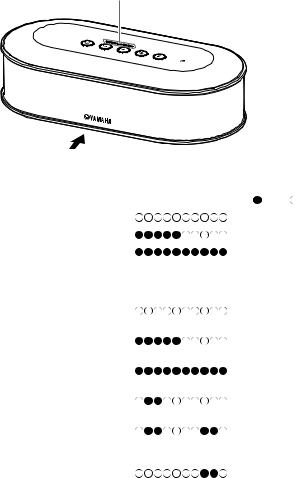
YVC-1000 User's Manual
■Level indicator (page 5: 3)
The level indicator shows the input level of an incoming voice, speaker volume, or speaker output settings.
Level indicator
The table below shows indicator patterns viewed from this side.
Status |
Description |
Indication example ( : ON, |
: OFF) |
|
Normal |
Indicates the input level of an |
|
No audio signal is input. |
|
|
incoming audio signal from the |
|
|
|
|
|
The audio signal is input. |
||
|
remote location or external |
|
||
|
|
|
|
|
|
|
The audio signal input level |
||
|
microphones (if amplifying |
|
||
|
|
is maximum. |
|
|
|
sound from external |
|
|
|
|
|
|
|
|
|
microphones in your location |
|
|
|
|
is enabled). |
|
|
|
|
|
|
|
|
When the speaker |
Indicates the specified speaker |
|
The speaker volume is set to |
|
volume is adjusted |
volume. |
|
the lowest level. |
|
(→ page 32) |
|
|
|
|
|
|
The speaker volume is set to |
||
|
|
|
||
|
|
|
the medium level. |
|
|
|
|
|
|
|
|
|
The speaker volume is set to |
|
|
|
|
the highest level. |
|
|
|
|
|
|
When the output speaker |
Indicates output settings of the |
|
The sound is output only |
|
is selected |
built-in speakers or external |
|
from the built-in speakers. |
|
(→ page 31) |
speakers. |
|
|
|
|
The sound is output from |
|||
|
|
|
||
|
|
|
both the built-in speakers |
|
|
|
|
and external speakers. |
|
|
|
|
|
|
|
|
|
The sound is output only |
|
|
|
|
from external speakers. |
|
|
|
|
|
|
7
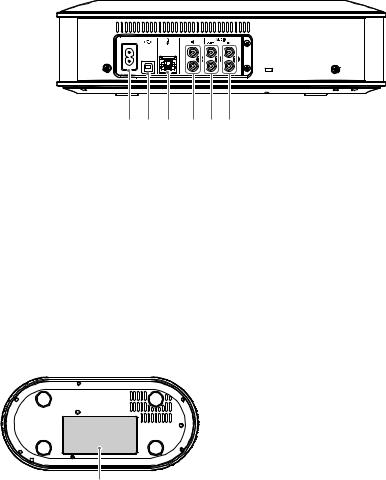
YVC-1000 User's Manual
■Rear
1 2 3 |
4 5 6 |
1Power terminal
Used to connect the supplied power cable.
2USB port
Used to connect the product to a PC or a Mac using the supplied USB cable.
3Microphone terminal
Used to connect the supplied microphone using the microphone cable.
4External speaker terminals
Used to connect the speakers to the built-in amplifier.
5Audio output terminals (AUDIO OUT)
Used to connect to the audio input terminals of a video conference system.
6Audio input terminals (AUDIO IN)
Used to connect to the audio output terminals of a video conference system.
External microphones can also be connected to the product by configuring a setting using the "YVC-1000 Configurator" application. (→ page 26)
■Bottom
1 |
1Name plate
Provides the following information. Model No.: Model number of the product
SERIAL LABEL: Serial number of the product
8

Microphone (YVC-MIC1000)
■Top
1 2
YVC-1000 User's Manual
1Microphone mute button (  )
)
Press to temporarily turn off (mute) the microphone. To cancel the mute function, press it again.
2Microphone status indicator
Lights up green when the microphone is active. Flashes red when the microphone is set to mute.
When the microphone is active, this indicator lights up brightly if sounds are input.
■Side
1Input terminal (IN)
Connects the optional microphone (YVC-MIC1000EX) using the microphone cable.
2Output terminal (OUT)
Connects the Control Unit using the microphone cable.
1 2
■Bottom
1Name plate
Provides the following information.
Model No.: Model number of the product SERIAL LABEL: Serial number of the product
1
9
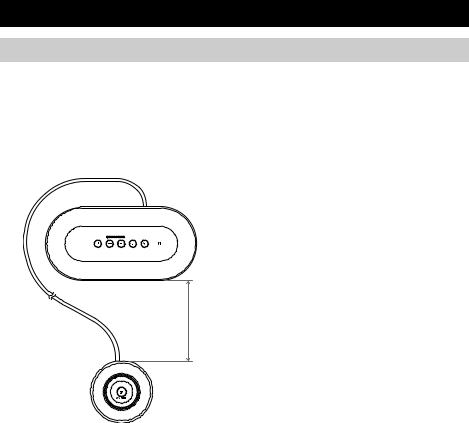
YVC-1000 User's Manual
Setting up for use
Installation
Place the product in a location you will actually use it in, for example, a conference room.
■Notes on installation
•Place the microphone at least 1 m (3.3 ft) away from the Control Unit. If the Control Unit is too close to the microphone, it may cause an echo phenomenon in the remote location.
•Keep the microphone away from any noise sources. If the noise source such as the heat radiation fan of a PC/Mac or a projector is close to the microphone, it may cause a reduction of the audio quality in the remote location.
At least 1 m (3.3 ft)
10
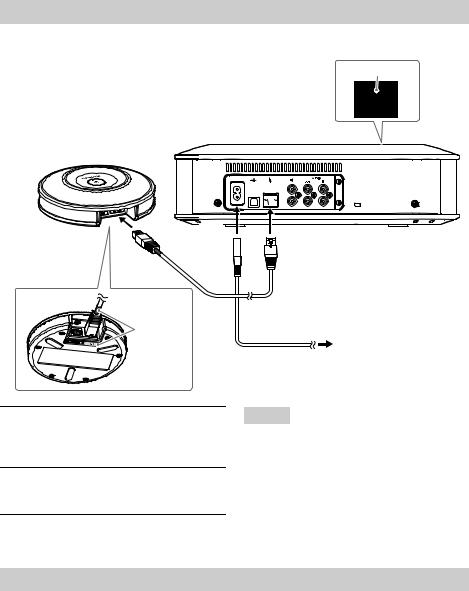
YVC-1000 User's Manual
Connecting the microphone and power cables
Connect the microphone and power cables supplied with the product.
Power button
1
2 |
1 |
Match the |
3 |
Plug into an |
color of the |
|
|
labels. |
|
outlet |
1Connect the microphone to the Control Unit using the microphone cable supplied with the product.
2Connect the power cable to the power terminal of the Control Unit.
3 Connect the power plug to an outlet.
The product enters the standby mode, and the power button (  ) lights up red.
) lights up red.
Notes
•When connecting the microphone cable, be sure to match the color of the labels on the microphone cable and of the microphone output terminal (OUT).
•Be sure to fully plug the power cable into the power terminal of the Control Unit and the outlet.
Adding microphones and speakers
If the product is used in an arrangement or in a conference with many participants where the product alone will not be sufficient, connect two or more microphones and external speakers. For details, refer to "Using the optional microphone (YVC-MIC1000EX)" (page 25) and "Using external speakers" (page 27).
The product also allows you to amplify the sound from connected external microphones, such as handheld microphones, in your location while having a conversation with the remote location. For details, refer to "Using external microphones" (page 26).
11

YVC-1000 User's Manual
Setup
Set the product up to make best use of it.
■Turning the power on
Press the power button (  ) of the product to turn the power on. When the power is turned on, all the buttons light up green.
) of the product to turn the power on. When the power is turned on, all the buttons light up green.
■Selecting the voice guidance language
The voice guidance language is set to English in the factory settings. Switch the language as necessary. For details, refer to "Changing voice guidance settings" (page 30).
■Selecting the speaker
Select the speaker output that suits your environment. For details, refer to "Selecting a speaker" (page 31).
■Adjusting the speaker volume
Adjust the speaker volume that suits your environment.
For details, refer to "Adjusting the speaker volume" (page 32).
■Carrying out automatic audio tuning
Carry out automatic audio tuning to ensure the optimal acoustic settings to suit the environment the product is used in. For details, refer to "Using the automatic audio tuning function" (page 28).
12
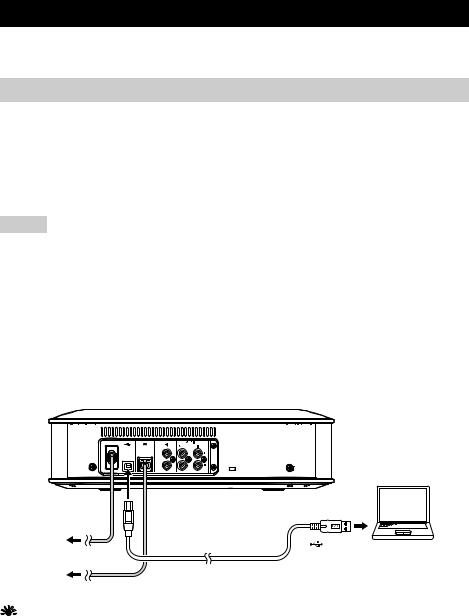
YVC-1000 User's Manual
Connecting to communication equipment
This section describes how to connect each communication device.
After connecting them, check whether or not sounds are output normally.
Connecting to a PC using the USB cable
■Before connecting, check the following.
Prepare the USB cable supplied with the product.
The following system environment is required in the PC to be connected to the product.
•OS: Windows (*1)
•USB: USB 2.0 or later
(*1) For the supported versions, refer to the following website: http://www.yamaha.com/products/en/communication/
Notes
•It is not possible to connect and use more than one microphone or speaker including the product to one PC at the same time.
•Do not use a cable other than the USB cable supplied with the product. If a different USB cable is used, it may cause operational problems.
•The product must be connected directly to a PC. If the product is connected to a PC via a USB hub, it may cause operational problems.
•In rare cases, the audio playback may be interrupted due to PC conditions such as the workload or limited free space in memory.
■Connection
Connect the product to a PC using the supplied USB cable. Before connecting them, set the product to the standby mode.
Plug into an |
|
|
outlet |
To |
USB port |
Connect to the microphone
You do not need to install the USB driver separately because the product is recognized as a basic USB audio device by the PC.
13
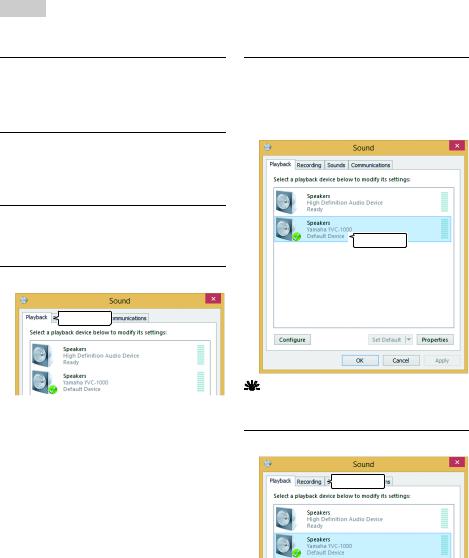
YVC-1000 User's Manual
■Checking whether the connection is made normally
After the connection has been completed, execute the following steps to check that the product is normally recognized by the PC.
Note
The items and other options shown in the setting window vary depending on your PC environment.
1Press the power button (  ) to turn the product on.
) to turn the product on.
When the power is turned on, all the buttons light up green.
2Display the control panel.
•In Windows 7, click "Start" - "Control Panel".
•In Windows 8.1/10, right-click at the lower-left end of the Start screen, then click "Control Panel".
3 Click "Hardware and Sound" - "Sound".
The "Sound" window appears.
4 Click the "Playback" tab.
5Check that "Yamaha YVC-1000" in the Speakers field is set to the
default device.
If it is not set to the default device, click "Yamaha YVC-1000", and click "Set Default".
Check
Click
Normally, when a connection is made, "Yamaha YVC1000" is automatically set to the default device.
6 Click the "Recording" tab.
Click
14
